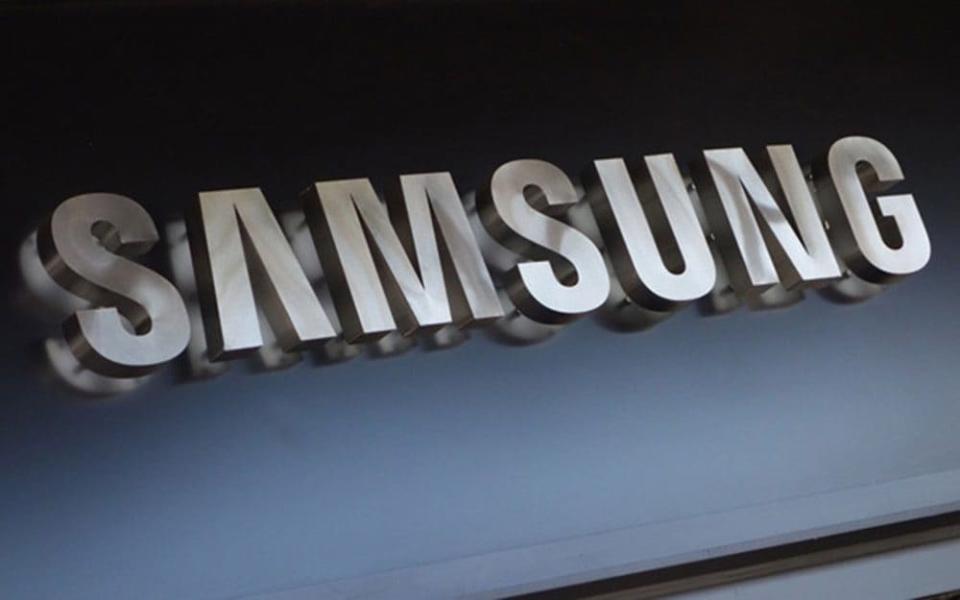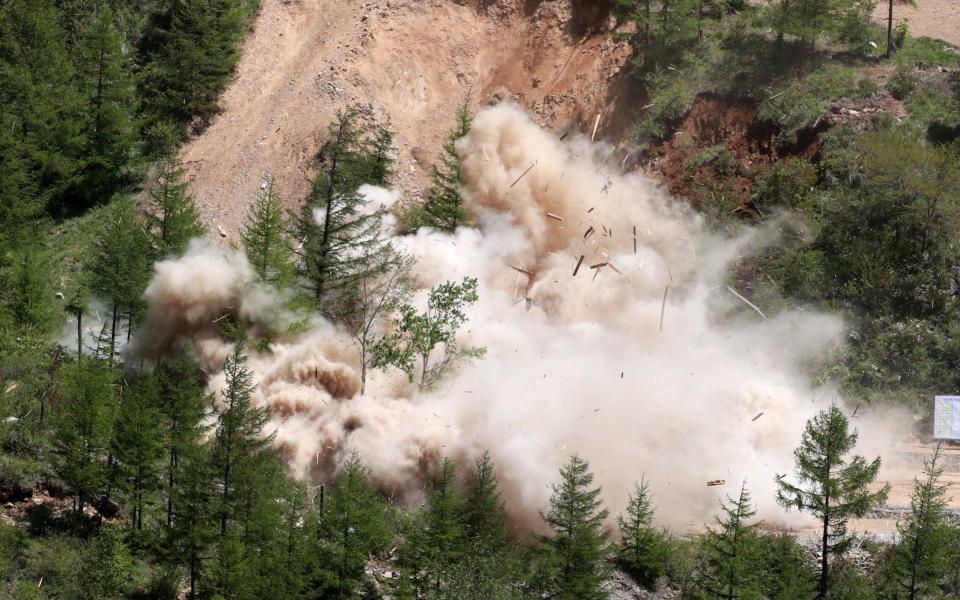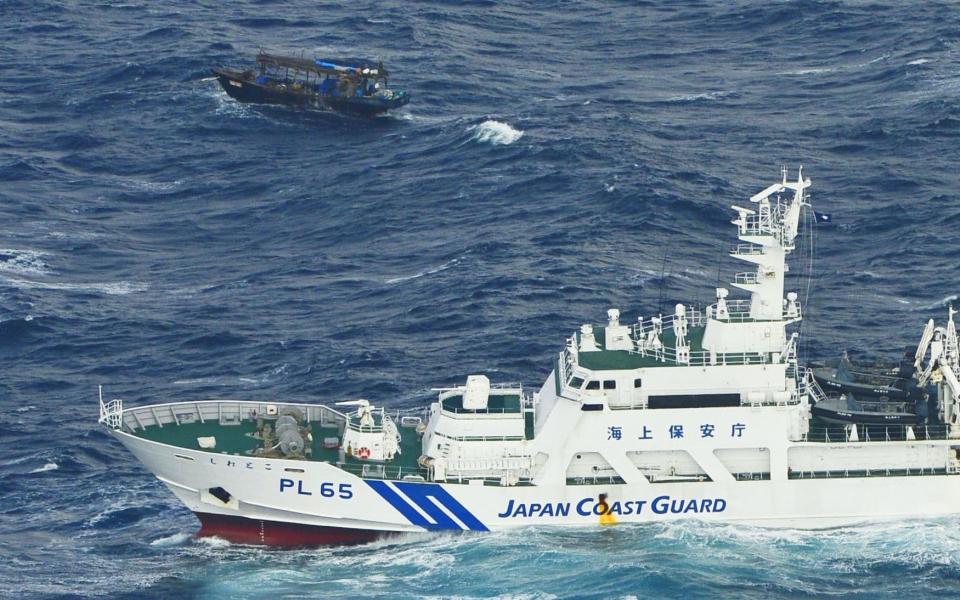The last British veterans of Korea: the Forgotten War

The last British veterans of Korea: the Forgotten War

ByHeathcliff O’MalleyTelegraph photographer
31 OCTOBER 2018 • 1:05 PM GMT
Four million people died during the three-year war on the Korean Peninsula between 1950 and ’53, and although nearly 100,000 British troops fought in the conflict it is seen by many veterans as ‘The Forgotten War’. Sandwiched between the Second World War and Vietnam, it was fought in an age before television, and the war-weary British public, barely out of rationing, had little appetite for further conflict. The vast majority of British soldiers who served were National Service and once their time was up they often came home, were demobbed and went straight back into the workplace with little recognition of their sacrifice.
Over many years I had developed an interest in the Korean War and read both Max Hastings’ books and, more notably, Andrew Salmon’s To The Last Round. But it was by chance, when shooting a feature on the Dorset coast over a year ago, that I met veteran Harry Hawksworth, who put me in contact with the remnants of the now defunct British Korean Veterans Association.

L/Cpl Mick Griffin in position with his Browning .50 cal machine gun
I have photographed and interviewed a dozen men who fought and served with a variety of regiments during the conflict. I have been deeply touched by not only their heroism and humility but also their willingness to talk about experiences that many had kept to themselves for decades. What struck me most of all was the importance of feeling amongst all 12 that someone was telling their story; the majority seemed to share the sense that British governments over the years had done very little to remember the sacrifices of soldiers. In fact, the relatively new Korean Memorial on the Embankment was gifted by the South Koreans and some smaller private donations.
The British military have fought in many conflicts since the Second World War, not counting Iraq and Afghanistan, with ‘small wars’ in Malaya, Yemen, Cyprus and Kenya and peacekeeping missions in Sierra Leone, Bosnia and Kosovo. Perhaps Korea has just been drowned out.
Included in these dozen portraits are an officer, a medic, some infantrymen, a gunner and a military policeman, all with very different experiences of the war. Nearly half the number were photographed and interviewed at the Royal Hospital Chelsea, where they receive the very highest quality of care, along with veterans from many other wars. The others I met either in their private residences or residential care homes.
All in their late eighties now, most were either in their teens or early twenties at the time, fighting in a country that, until their orders came through, most had never heard of. Although I personally can never see a time when the human race will be at peace, I strongly believe the importance of never forgetting the sacrifices made nor the horror we force upon each other in times of conflict, often for little gain. In the case of Korea though, it does appear that some good came of the United Nations’ first foray into conflict resolution, and many would argue that South Korea’s post-war success story is proof of that.
I’ll end in tribute to Bill Speakman VC, who died in June, with one of the last sentences he spoke to me this year, on his thoughts regarding the sacrifices that were made.
“You can find certain places and you’d wonder whether it was worth it. South Korea was worth fighting for – look at them today.”
Alan Guy, RAMC 10 Field Hygiene Section
Age when deployed: 19 yrs

“Nineteen and stupid, I was scared stiff.” Alan Guy, 85 years old, served in the RAMC 10 field hygiene section from January 1952 until September ’53. He is photographed at his home in Byfleet
“I applied for a posting in Bermuda but that wasn't to be and was told “You’ll need your ice skates where you’re going! I was on this boat approaching Korea and this big US Marine sergeant, I don’t know whether he took pity on me because I was so young, looked at me and said ‘You worried lad? You’ll be alright son’. Nineteen and stupid I was scared stiff.
“The first thing I noticed was the smell. Oh god, you could smell it drifting . The problem was in those days – Korea’s now built up and it’s absolutely wonderful, but in those days it was mostly paddy fields and rice production and they used to fertilise with human manure.”
Alan was promoted to sergeant and joined up with the 10th Field Hygiene section and set up a forward operating base in an advance party close to the frontline.
“That was particularly soul-destroying, you had to do an all night guard every third night, in the middle of nowhere, didn’t know where we were, didn’t know who was around us and bitterly cold and only had a little pop-up tent.
“I remember being on guard one night and seeing a light coming towards me. I said ‘Halt who goes there?’ No answer. ‘Halt who goes there?’ and by then I’m really worried – and then eventually a firefly just came over my shoulder. You can imagine the relief!
“I visited all the Commonwealth units, Australians, Canadians and British; just giving general advice on all aspects of how to prevent frostbite, how to avoid getting malaria, how to treat water supplies and so on. Any aspect of health really. It was quite amusing, in a way. I remember we ran a little seminar for some of the frontline troops, who were grateful for a little rest, as it were. One of the things we showed them was we found the dirtiest ditch we could find that was full of water and we filtered it and offered it to them to drink. They then realised that could really be useful if they were stuck somewhere; it could really save their lives.”
Alan joined the Surrey Ambulance Service on his return but was recalled in ’56 for the Suez crisis.
Mick Griffin, 1950-51 L Cpl 1 Batt Royal Norfolks
Age when deployed: 19 yrs
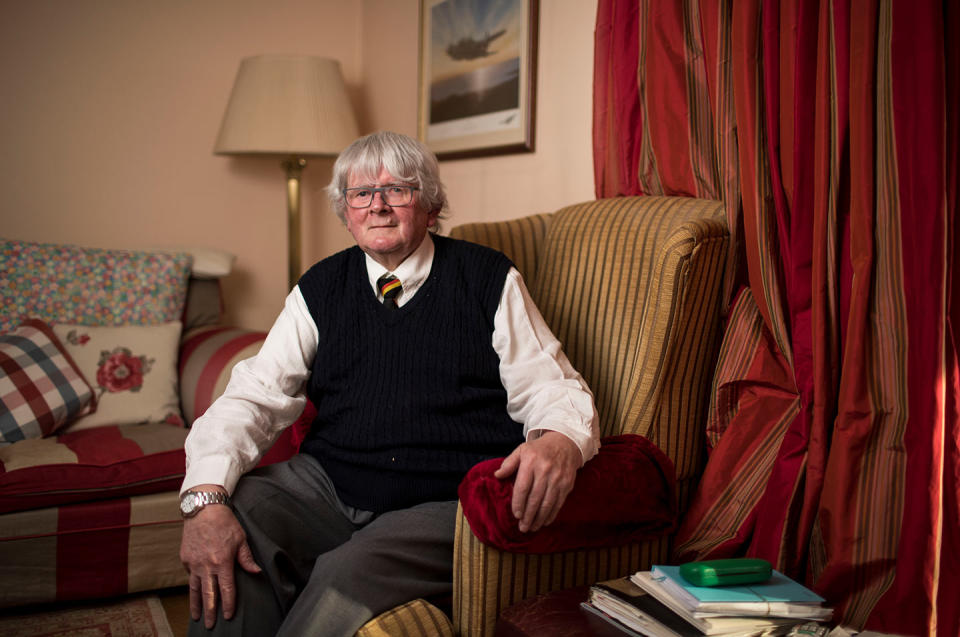
Mick Griffin, photographed at his home in Byfleet, was 19 when his Korean service began
“As we got off the boat we were handed a hundred rounds of .303 ammunition each, and I thought ‘this isn’t too good’. We were relieving the Royal Ulster Rifles and they told us it hadn’t been too bad. And the fella I was talking to said it’s not too bad – but his No 2 on the Bren [light machine gun] had been shot in the head and killed.
“It didn’t scare me. Don’t forget, we were 19 and things didn’t worry you too much. It was only later that we got worried.
“There were 10-20,000 Chinese dug in in front of us on Hill 355 – all the time there were airstrikes coming in. Earlier on in the war an F-84, an American jet, attacked us. It came in machine gunning and then released two napalm bombs, but they landed on the hill behind us. The only casualty was one of the fellas who dived into his bunker and landed onto something he was cooking and got burnt.”
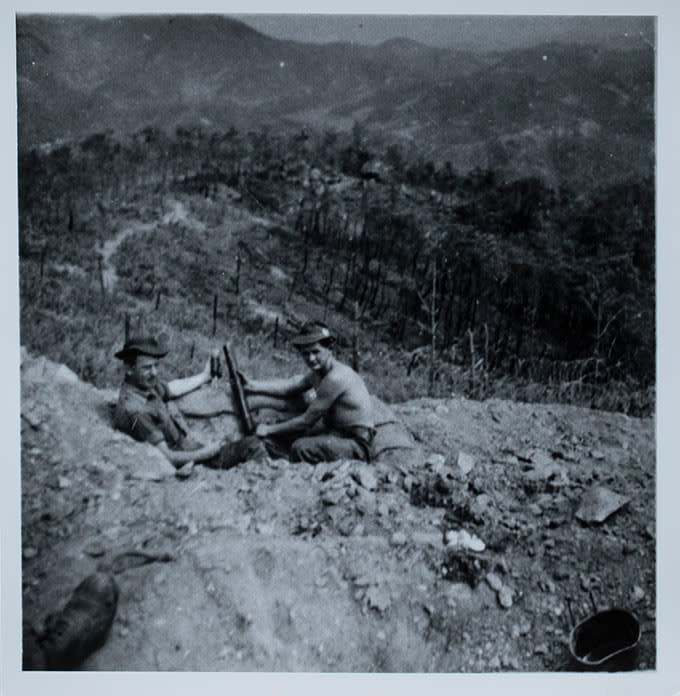
Mick in a mortar position
“I think the Chinese were more frightened of us, more so than of the Americans. At the British positions there were no lights showing. With the Americans there was lots of noise and lights flashing; with us, they never knew how many of us there were.
“Some nights there you’d think something was going on – blimey that was frightening. I could sleep through a mortaring ‘cause I got so used to it. You could see for bloody miles, there was a river going through, but we kept our eyes on the barbed wire and the scrub in front of us and if anything moved we shot at it.”
On returning to England after his tour as a National Servicemen in Korea Mick was disappointed. “We were the first lot of Royal Norfolks to get back on the Empire Fowey. We got the train from Southampton to Norwich and thought we’d get a bit of a reception and all as the first of the Battalion back. But all they sent was a lorry for the kit bags. We had to march to the castle in Norwich. We were pretty hard so it didn’t matter, but there was no beds for us, we had to sleep on tables!”
Mick joined Vickers Armstrong on his return and built aircraft.
Gerry Farmer, 1951 Royal Fusiliers
Age when deployed: 18 yrs
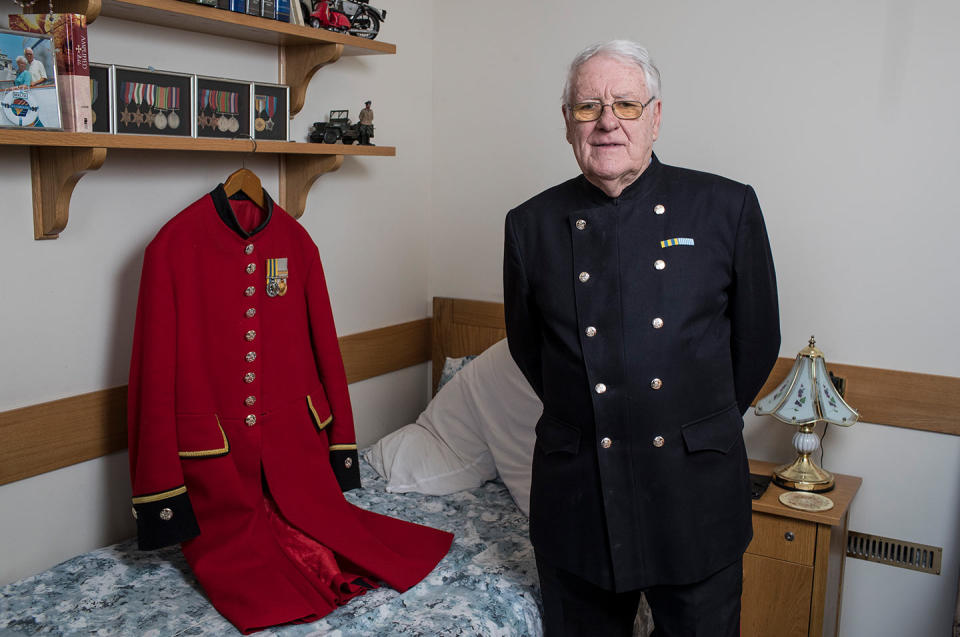
“I’ve still an inch and a half of shrapnel in my spine.” Gerry Farmer, photographed at the Royal Hospital Chelsea
“When I was 18 there were seven wars to fight in, including Aden, Cyprus, Kenya, Korea, Malaya. All my friends I was at school with joined the army; a couple got killed in Malaya.
“We trained on the .303. It was a really good rifle but we couldn’t use them in Korea. It was more closer kind of warfare, so we used the Sten gun.
“It was always jamming, but it was all our fault. Some had the magazine on the top but we liked the side ones. We’d hold the magazine and if it moved slightly the next round wouldn’t come out, they jammed.
“We were told we were going to Kingston Jamaica, but instead we went to Brentwood and then waited for a ship to Korea. We went on the Orwell, a German liner. It had big eagles stamped into where the funnels were.”
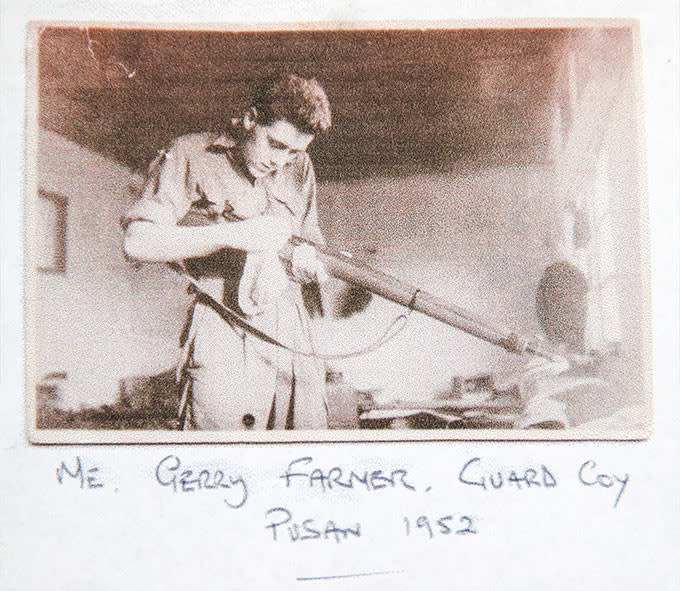
“When we got to Port Said we weren’t allowed off because King Farouk was being deposed at the very time. The first time I looked out the porthole I saw a camel with a guy wearing a red fez.
“We got to Pusan: I was the second one down the gangplank. It was the whole regiment; on the quayside there was a black American band doing the St Louis blues. It was great.
“My wounds were not so bad; I got wounded. June 12 1953, in the CO’s Jeep. We got mortared on the hook. The Chinese were mortaring all the time. It landed about a yard from the Jeep and blew me out about 40 yards. I couldn’t breathe, couldn’t feel me legs, then all of a sudden a MASH (mobile army surgical hospital) helicopter came down.”
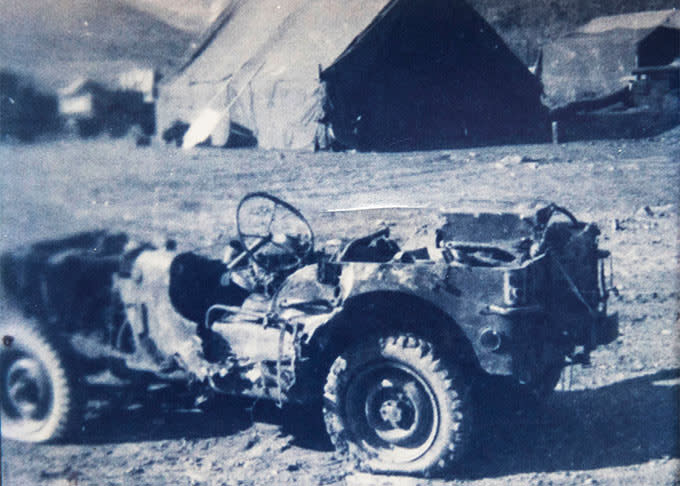
Gerry’s wrecked Jeep
“Korea was an infantry war. The Chinese were just like us; they were young kids just like us and national service. Everything was so close-call, we used to have American stuff, like flak jackets. I’ve still an inch and a half of shrapnel in my spine. They said it was better to leave it or I wouldn’t walk again, as it’s between the knuckles of my spine.
Gerry went out in the Jeep on another mission with four signalers, who were caught smoking in the dark by the Chinese mortars. When Gerry tried to speed off, the Jeep went into the river and all five were trapped under it at the river bottom for some time before finally getting to safety. “I’m claustrophobic now, I’ve not been in a lift since March ’54, I came out a nervous wreck.”
After Gerry left Korea, his friend Cpl Derby was shot and killed mistakenly by a sentry at night, shortly after agreeing to stay and serve another year.
Bill Speakman VC, 1st Battalion King’s Own Scottish Borderers – 1927-2018
Age when deployed: 24 yrs

“South Korea was worth fighting for.” Bill Speakman VC, photographed at the Royal Hospital Chelsea
As a Victoria Cross winner, Speakman was one of the better-known soldiers of the Korean conflict and would regularly be seen on Remembrance Sundays at the Cenotaph in his wheelchair, with all the other British Service men and women who pay tribute to the fallen.
On the day that I met him at the Royal Hospital Chelsea he struggled with his memories of Korea and how he won the Victoria Cross. But he had this to say:
“I was a loner as a kid. I never saw my father, my mother brought me up. I think I was always a bit of a loner but I was happy with it. I just decided that the Army was for me. I falsified my age the first time but they tumbled it. But then I got my call-up papers and I’ve never looked back since.”
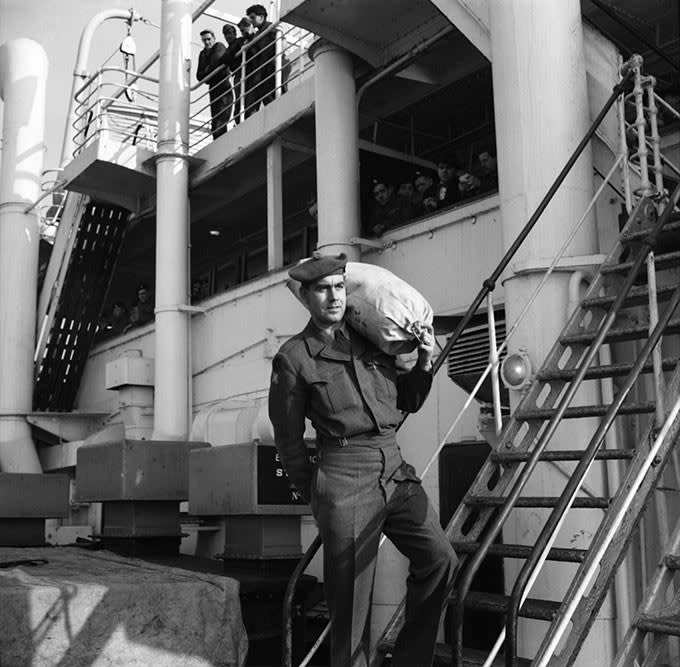
Private Bill Speakman leaves for Korea, March 1952
“I volunteered for Korea, that was the big turning point in my life. We fought all over Korea wherever we were needed, that was it really. It was a huge frontline, you just didn’t know what was going to happen. It was a very interesting place, and I’m glad I went there, I’m glad I volunteered. I wanted to see fighting and that’s what I got there.
“There were thousands of us and we all did our little bit. It made South Korea what it is today, you know. You thought, you can find certain places and you’d wonder whether it was worth it. South Korea was worth fighting for – look at them today.”
Speakman went on to spend several years in the SAS: “I was in a few hairy spots, but you were left to your own devices, which was a good thing.”
Alfred Mason, Durham Light Infantry (28 Commonwealth Brigade)
Age when deployed: unknown
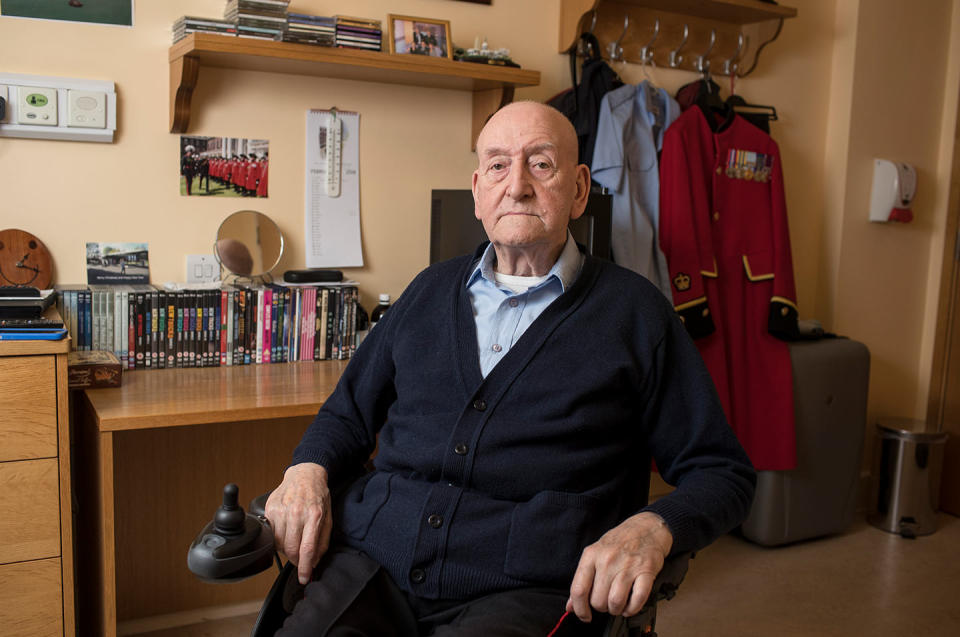
Alfred Mason, Durham Light Infantry, photographed at The Royal Hospital Chelsea
“[On arrival on the front line] we settled down and did virtually nothing as there was nothing going on. Our next position was Hill 159, that’s the height in metres of the tallest mountain in that area.
“After that was 355, which was known as ‘Little Gibraltar’. That was a massive hill. You couldn’t go wandering about because of all the mines that were laid, either theirs or ours.
“Unfortunately we had two young 2nd Lieutenants killed who had only just arrived. They were being briefed by our officer when a mortar landed in the trench. It killed the two 2nd Lieutenants but never harmed the officer.
“Everywhere you went you were on hills because if you could hold the hills no one could get past you. So it was a matter of holding all the best hills in the area. You were normally awake all night on stand-to and in the day you did all your chores. We lost quite a few lads altogether, most on Hill 355.
“In the summer it was hot. It went cold, absolute cold. It was minus 40 – you put on every bit of kit you’ve got.”
Colin Thackery, 1950-51 Royal Artillery
Age when deployed: 20 yrs
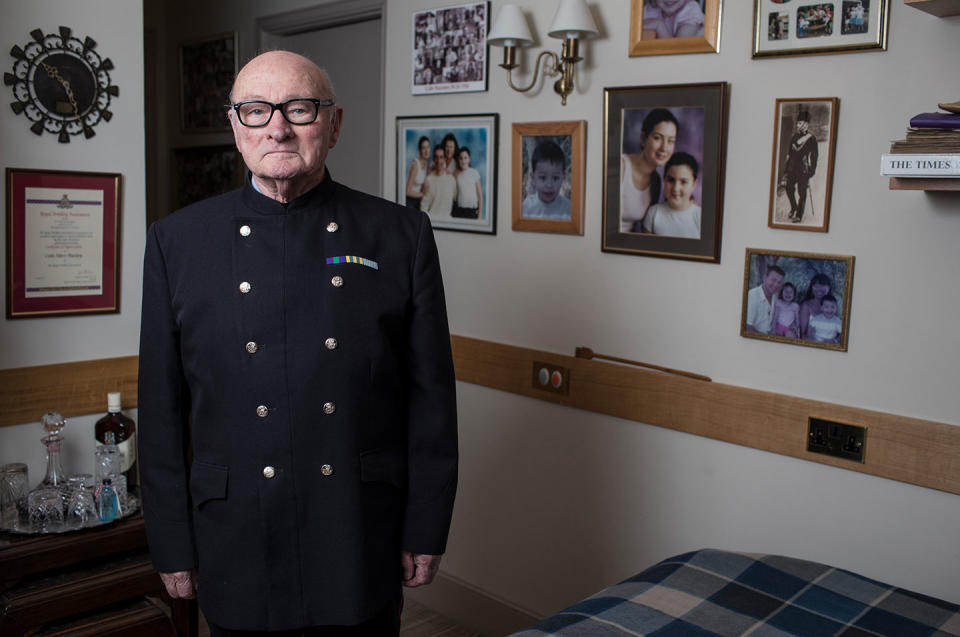
“War’s a filthy business.” Colin Thackery photographed at The Royal Hospital Chelsea
“I was part of 45 Field Regiment on the OP (observation post) Party, assistant to the Captain, supporting the Glosters. We went all the way to the border (of China); we were to meet a company commander. They were guarding a load of engineers getting ready to blow a bridge. They said: ‘The Chinese are coming, they’re gonna be here any minute!’ Three days later we were still there, and still no Chinese.
“The officer we met was Capt Farrar-Hockley. We got into quite a number of scrapes actually. I was just a sprog then, literally the youngest. The regiment was full of reservists – all the blokes in the OP Party were all years older than me. They had been right through the war (WWII).
“At one time we took over some Chinese trenches. The Old Man told me to take first stag (sentry duty), so I did. It was getting dark and I was sitting in this thing with my headset on making my reports and responding on the radio. This big Yorkshireman came in, reached over and said ‘cup of tea’ then ‘who’s your friend?’ I looked round and there, sitting next to me, was a dead Chinese man, frozen solid.”
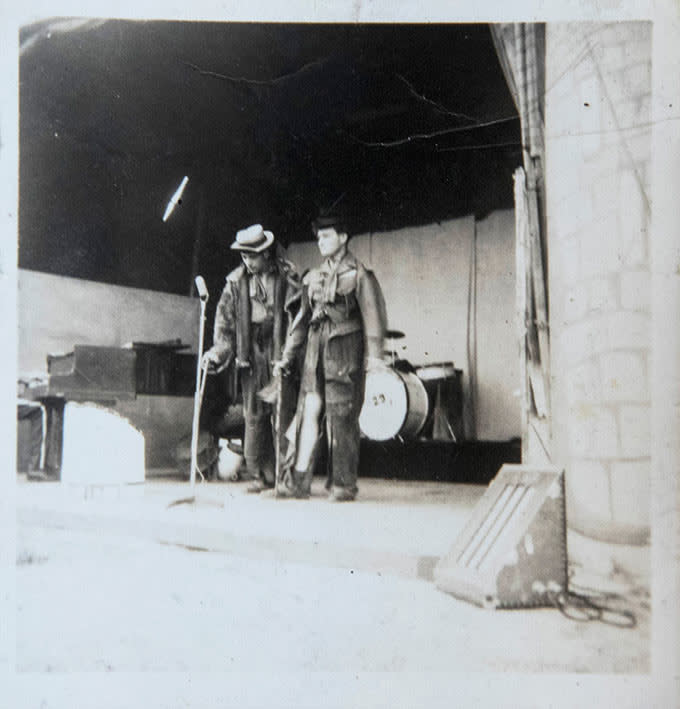
Colin Thackery performing in Korea before returning to his unit supporting the Glosters
“You took your part as an infantryman really when on the OP. I had a revolver, but also a Sten gun. There were occasions when an attack was coming in, you couldn’t just sit there and do nothing. You started to fire back, whether you hit anyone or not. There were thousands of them, shadowy figures wearing these funny, little, quilted shell-suits.
“When I got to Korea we were in battle for a while, then all of a sudden there was going to be peace so we were told to dig in and make ourselves comfortable. The brigadier said to all the officers in the brigade, ‘Get me those young men in the concert party’. My orders were to assemble and go round and entertain.”
In fact, the war wasn’t over at all. Several Chinese armies had managed to creep up to the thinly-stretched UN positions unseen and were preparing for an all-out push to obliterate the line defending Seoul. And of special interest was the section under the command of the British 29 Brigade, protecting the route across the Imjin river north of what is now the South Korean capital.
“I was sent back from concert duty. I got back to my unit and the old man said go and get some batteries, because they (the Glosters) are surrounded. I went haring off in a Jeep for the batteries and on the way back the MPs (Military Police) stopped me and said ‘You ain’t going anywhere, mate, they’re surrounded. No good you going up there, you’ll be taken.’ The rest of them were taken prisoner. I missed it by not being able to get back. There was a feeling of wanting to be there with the chaps but then realizing a bit of self-preservation really. It was a good thing I wasn’t going into the bag.”

The Royal Artillery with South Korean soldiers – from Colin’s own collection of photographs
“Korea wasn’t happy place; it was in ruins. Funnily enough, we had a delegation from South Korea. We were having a drink in the club, this naval attaché came. The Korean people were really, really pro the troops. I never personally indulged.
“Loads of guys out there went back (after the war). I never wanted to go back, too many memories. It’s just that war’s a filthy business. It’s conflict and you’re in danger all the time. I don’t want to make too much of it. It was awful, war itself, all wars are awful. Life seemed to be so cheap, especially amongst the Chinese.
“I think it’s extremely sad that we lost an awful lot of people; it seems to me unnecessary. And what they allowed to happen was this DMZ, and the North Koreans to develop their evil empire on the north side when the South Koreans developed themselves into a proper, civilized country.
“Koreans are very nice people, very homely and I’m sure they didn’t want war really. I find it very very sad. I find it a parallel, too, in Afghanistan. Y’know, you often talk about these things and all those blokes we lost out there and the Taliban are gradually going to take over.”
Colin got frostbite whilst cut off by the Chinese and to this day suffers and takes penicillin. He now resides at the Royal Hospital Chelsea as a Pensioner after recently losing his wife.
John Juby, Pioneer, the Royal Norfolk Regiment
Age when deployed: 21 yrs
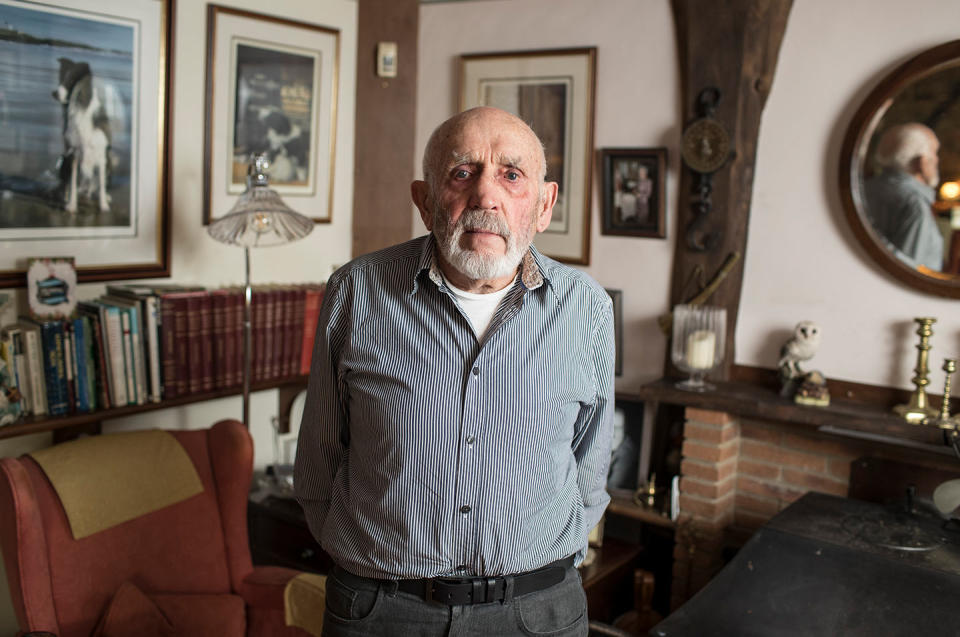
“I was very much a different person when I came home.’ John Juby 86, photographed at his home near Ipswich
John spent his 21st birthday on the troopship bound for Korea.“I was very nervous as I didn’t know what it was all about and all the shells and noise took a while getting used to. You got to learn the different sounds of shells going out or coming towards you.
“The land was very barren. It was a static war that was just trench and dugouts warfare, really, and you’d go out on patrols into No Man’s Land. Nearly everything out in front of you through the course of the war had been burned off by napalm bombs. There was very little vegetation in front of you; all you could see were the hills where the North Koreans were.
“One horrible job: I had a school friend of mine, he was killed. I had the job of wrapping him up in a blanket and taking him back to the American Cemetery Commission where they tidied him up. I had that job several times and it never got easier.
“I was an NCO so I went to every company in the regiment. I didn’t do as many patrols as a lot of the NCOs, as I had other jobs to do. We used to scrounge so much kit off the Americans; was unbelievable the equipment and stuff they had that we didn’t.”
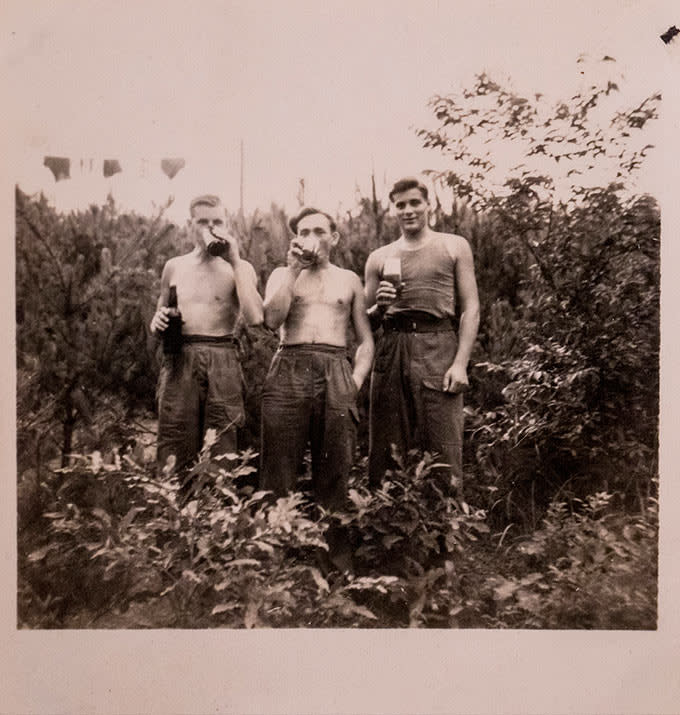
John Juby and friends
“The Korean people, to me, are a fantastic nation, especially towards the British Army who fought out there. The gifts and things we get from them is unbelievable. Another thing; the Korean government paid for the British Korean Veterans memorial in London. Not the British damned government, the Korean government paid for that.”
John fought for seven years to get his friend Roy McDonald’s name on the Cenotaph in Ipswich. “That was just battle, battle. If it wasn’t for the Afghan war – an Ipswich boy was killed there – I wonder now whether the Korean vets’ names would even still be on it. It was never classed as a war, only as a conflict, wasn’t it? It’s a pity they don’t realise there were four million people killed, a lot of them civilians.
“I was very much a different person when I came home to what I was when I went out there; 19 years old and then come home at 22. Being through all that does, I suppose, does change your outlook. I never regretted going out there. I enjoyed Army life. If it weren’t for my dear old mum I’d have become a regular.”
Arthur Bisson, Royal Military Police
Age when deployed: 26 yrs

“The poor lads in the infantry got the worst of it.” Arthur Bisson, 96, photographed at the Royal Hospital Chelsea
“We got there in November 1950, spent Christmas in Seoul and then the Imjin Battle in April 1951. My main job was keeping the traffic moving, signing routes, keeping the roads clear, general traffic control.
“We only saw the outskirts of the Imjin battle, the infantry saw the worst of it. I have memories of dirt roads, driving for hours on end when it was dry, making big clouds of dust. It was a very backward country. When you see pictures of Seoul now, good god!
“It was nice to get home, the poor lads in the infantry got the worst of it, in a sense I was lucky.”

“After Korea I was sent to Tokyo. For me it was more dangerous in Tokyo than Korea; imagine all the troops getting together in the beer halls. Cor blimey!”
Arthur was demobbed in 1947 and then called up again in 1950 for Korea. He served there for eight months in total.
Harry Hawksworth, Gloucestershire Regiment
Age when deployed: 18 yrs
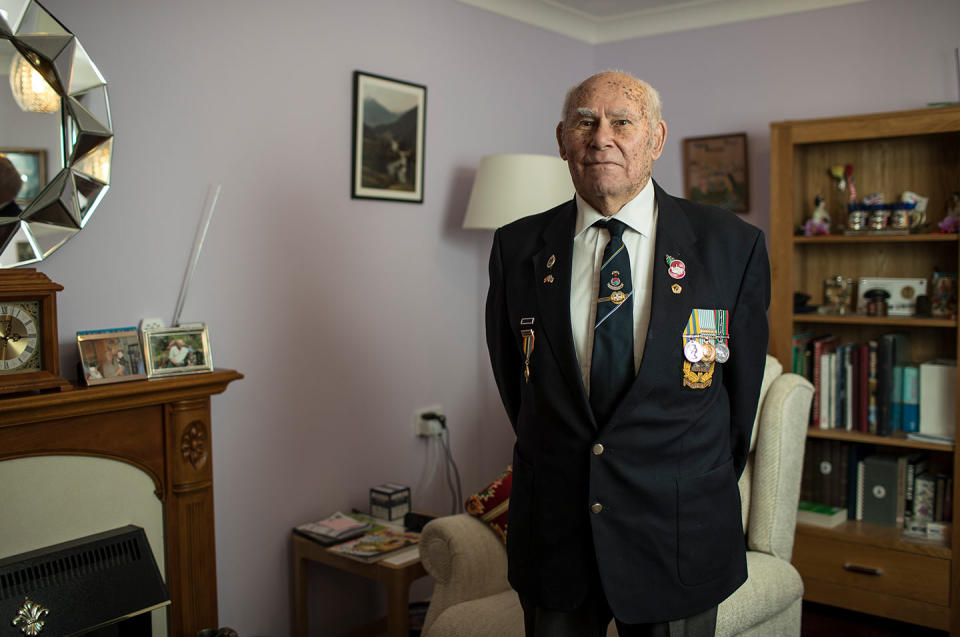
“It was like a turkey shoot.” Harry Hawksworth, photographed at his home near Ipswich
“I didn't even know where Korea was, we were on CO’s parade and he gets up and tells us the Korean War has started and we had to go out there and do our bit. We left in October, it was quite a journey.”
On arrival the Glosters weren’t particularly well-equipped for the extreme weather conditions that were to follow. “All we had different to what they gave us in Britain was a string vest, which held the heat of the body and kept you warm.”
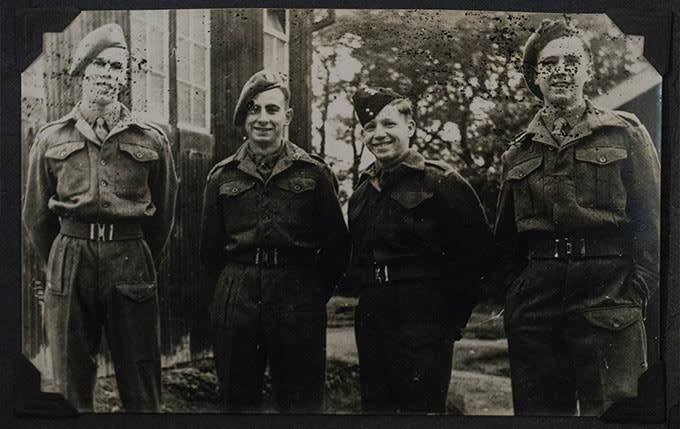
Harry Hawksworth and friends on deployment in Korea
“It was like a turkey shoot, you could see them coming, I didn't count how many I knocked off. I don't know if I knocked any of them off, I wasn't a bad shot so I expect I did, but it was nothing to be proud of. It was either them or you. I could have had a Sten gun, being an NCO, but I'd rather depend on a rifle, y'know bolt action. It wasn’t an automatic but I could get 10 rounds off as quick near enough as one of them.
“I was in a trench and Farrar-Hockley was with the bugler – the Chinese used to communicate with a bugle because they didn’t have wireless. You could hear them playing this bugle, telling their units what to do. Farrar-Hockey said, ‘Get up and play all the bugle tunes except retreat’, and he got up and blew these and honestly the firing from the Chinese went dead. It went as quiet as anything, there weren’t a sound anywhere. They didn’t know what was happening, you can imagine can’t ya! Then for about 10 minutes it went quiet and then they started firing again and playing their bugles.
“We got knocked off our first ridge, and we congregated on Hill 235, or Gloster Hill, and we just stood there till we ran out of ammunition. The Commanding Officer, Col Cahn told his men, ‘We were told to hold this position as long as we possibly could, which we did, but we’re now out of ammunition. I’m afraid, God bless you all, it’s every man for himself.’
“We had to decide which way to go. We didn’t get very far, as the whole place was covered with bloody Chinese. As you got into the valley, you heard what is known as a burp gun firing over your heads – the Chinese had what was known as a lenient policy. They’d had casualties galore, they really did take some casualties, I saw piles of them, terrible. That was it, they came in and took our rifles of us, not that there was any ammunition to fire back at ’em, and then we were PoWs.
“They made us camouflage ourselves as there were American spotter planes going all over the place. They didn't see us as the Chinese were very skilled in camouflage; just a little twig here and there y'know, and you couldn’t see them. In the dark hours they marched us across the Imjin. They said take off your shoes, trousers, pants and carry them across the river. We then had them dry to put on the other side. They were thinking of themselves as much as us, which was good of them.”
It took the defeated Glosters, over 500 of them, six weeks to get up to Chung Sung on the Yalu river where they were were held for two-and-a-half years until the Armistice was signed.
“Life as a PoW, it was very bad. There was no such thing as a camp; the Chinese commandeered a village, chucked all the Koreans out. We went into their mud huts, had no bedding or anything. We had rice, it was unwashed. It was like that for ages. In this camp we were about 200 in this village. We always knew who was doing well down the front, whether it was the Chinese or the United Nations. If it was the Chinese doing alright we all got extra tobacco or extra sugar, if they weren't we wouldn't get none.”
Harry didn’t talk about his experience as a prisoner of war publicly until recently. “I don't talk about it a lot because it’s upsetting, people don’t know what it’s like going into another world when you’re a PoW. When we got caught we didn’t know if we were going to get shot or whatever, we don’t talk about it a lot. When people do ask me, I don’t like telling them to shut up or anything like that. I say to them ‘they didn't treat us as bad as the Japanese’, which they didn't. The Japanese made them do the railway and things like that – thousands died didn’t they?”
Arthur Moulder, Royal Fusiliers, 1951 Signaller, B Company
Age when deployed: unknown
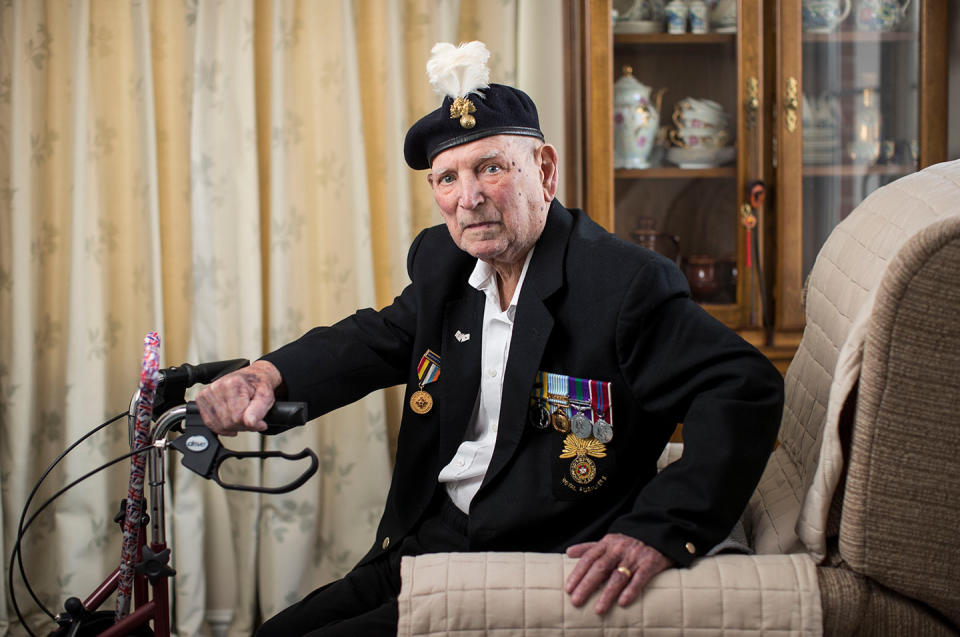
“I think about it regularly. It doesn't go away.” Arthur Moulder photographed at his home in Byfleet
“I was in Queen’s Royal Regiment, then I heard the Fusiliers were going to Korea, wherever Korea was ’cause nobody really knew. We didn't know how small the country was. When we got there, it was like living in Woking. Tiny, little country.
“We went by ship – the HMS Halladale. I was there for about 12 months really, and then they sent me home for the Coronation. I was part of the Queen’s escort in the Coronation. I met the Battalion in Egypt after that.
“The only way I could get to Korea was to sign on for a three-year engagement, I thought it was the right thing to do. It was under the United Nations and they had to be stopped, and that's what we did.
“We were on Hill 355; we got attacked a couple of times but we held them off. We would go out on patrol, and get mixed up with them on patrol. I lost one of my mates. Cpl Williams, I will never forget that name. We met all these Chinese, and we had a bit of a skirmish with them and Taffy never came back. It was a shame, I never forgot him.”
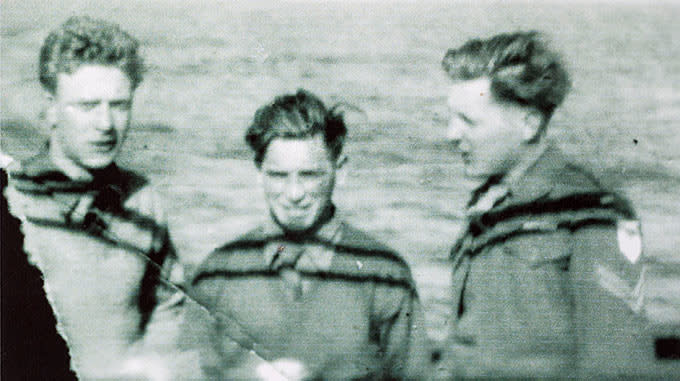
Arthur Moulder (centre), Maurice Micklewhite aka Michael Caine (left) and Cpl Coward (right)
Arthur was mentioned in Despatches after going back to try and find Williams and in the process was wounded in the arm by a grenade. The loss of his friend is something Arthur has never been able to forget.
“Some of us got wounded and, as I said, we lost Taffy Williams. I think we got the better of the enemy in the end. I think we won the day except we lost one man, one of them bad days. I tried to find him and I couldn’t, I tried to find Cpl Williams. There were so many things to be aware of, looking for the enemy, that you just carried on though. Even today, I haven’t forgotten Cpl Williams... oh well.”
As a reward for his gallantry Arthur was sent back to Britain
“Because of what I did, I was sent back, there were about eight of us and we marched behind the queen during the Coronation.”
Arthur worked for British Aerospace as a heating engineer after leaving the Army. One of his duties was to look after the bouncing bomb inventor Barnes Wallis’s heating. “He said, ‘Come and have a look at all this.’ He had on his desk all these drawings of swing wing aircraft and stuff. He wasn’t supposed to! He was a nice man.
“One or two blokes I knew suffered a bit afterwards because they came straight home (being National Service), but I was lucky I never. I had the Coronation, lived in the Tower of London, then went to Egypt and Sudan, so all that. The only thing is I regret not finding Cpl Williams. I think about it regularly. It doesn't go away.”
Tony Towell, 16/4/31 87, Royal Norfolks, 8 Platoon, C Company
Age when deployed: 17 yrs
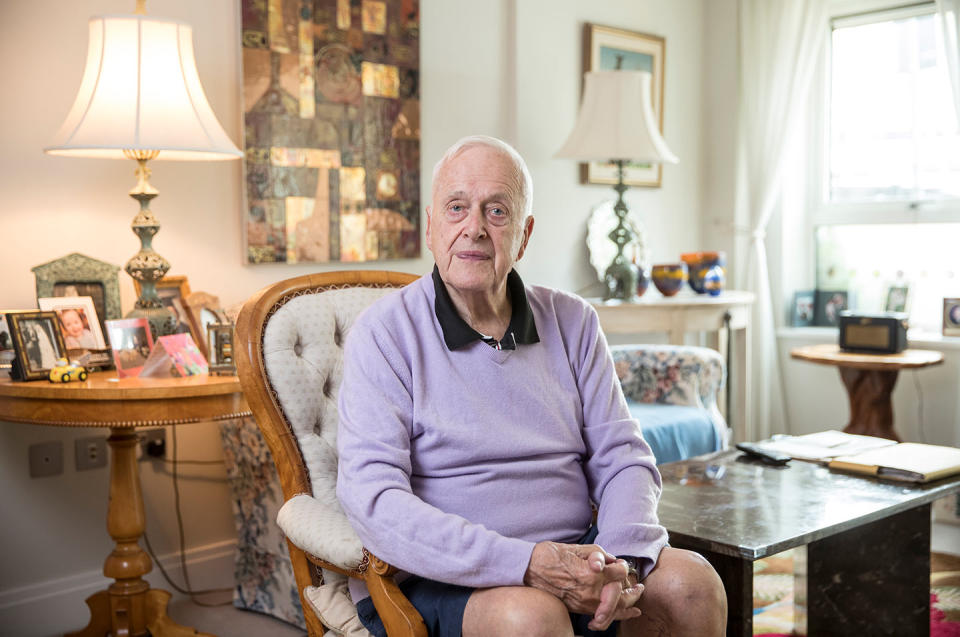
“I have nightmares probably once a week, even now.” Tony Towell, 87, from Potterspury, Stony Stratford
“I walked into the recruiting office in Trafalgar Square and was received with great honour until I reported my age, then they had a problem.” His date of birth, April 16 1931, was altered by six months.
“I joined as a private in the Suffolk Regiment and said I wanted to be an officer. I joined Royal Military Academy Sandhurst, Normandy Company, in January 1949.
“We tried training on the ship (to Korea) and shooting, which was appalling. We towed targets behind the ship and all we’d all fire Bren guns and rifles and seldom hit anything, which was a bit worrying! We eventually got to Pusan (now known as Busan), and the smell of human waste used in the fields as manure was overwhelming. We got on a train and headed north, straight into the trenches. Poorly dug out, on the line. On the very first night the Americans decided to do strategic bombing about half a mile in front of us. We wondered what the hell was going on, we had no idea.
“We had to attack a hill, the maps were very poor – they were old Japanese maps. We were doing a recce on top of a Centurion tank with the Colonel. I couldn’t find the damned hill. Suddenly, there was a funny sound. ‘Come down, you bloody fool! Don't you know you're being shot at?’ That was my first indoctrination.
“We learnt to live in the trenches on American rations. We became very streetwise; the officers were allowed a bottle of whiskey, which we had to pay for per week. It had great marketable value. You could acquire a .45, which most of us did, or a carbine (rifle) or, in fact, a Jeep for a couple of bottles of whiskey.”

“Life was spent putting up barbed wire or mines, which were terrifying as every so often one would lose the map of where the mines were.
“I never put anybody on a charge ever in my entire military career. I'd say ‘Look, you're letting everybody down, is that fair?’ If you couldn’t control it at your level there’s little point, unless it was a serious crime, in reporting it up, because it just kicked the can further away.
“They didn’t know why they were there, it wasn’t clear why. We were fighting Communism, ‘Well what’s that, sir. Why?’
“You dug into a little 10x6 ft dugout, which was part of the line of the trenches. You probably had a foot of protection on top which would save you from everything except for a direct hit.
“Our mission was then to capture an enemy soldier. Most of our patrols had been unsuccessful; we didn’t know which unit we were fighting. We didn’t know what number.
“Intelligence wanted to know if it was Army 5 or Army 6. It was thought that it was this hill that Speakman’s unit lost, heavily fortified, heavily defended. You could see through the Centurion tank telescope on the trench, enemy soldiers moving up and down. We decided on a patrol of about 40 people from our regiment, which I was in charge of.
“The plot was the Pioneer Corps under Jonathan Wormald, a young 2nd Lieutenant in my cabin, from a very large Norfolk family, and 12 of his company, because he always wanted to be in the war fighting instead of laying mines – they were to creep up and pounce in the trenches, grab somebody and run back.
“My job was to command the whole thing and to be two or three hundred yards back and take the printers off them and help them remove themselves.”
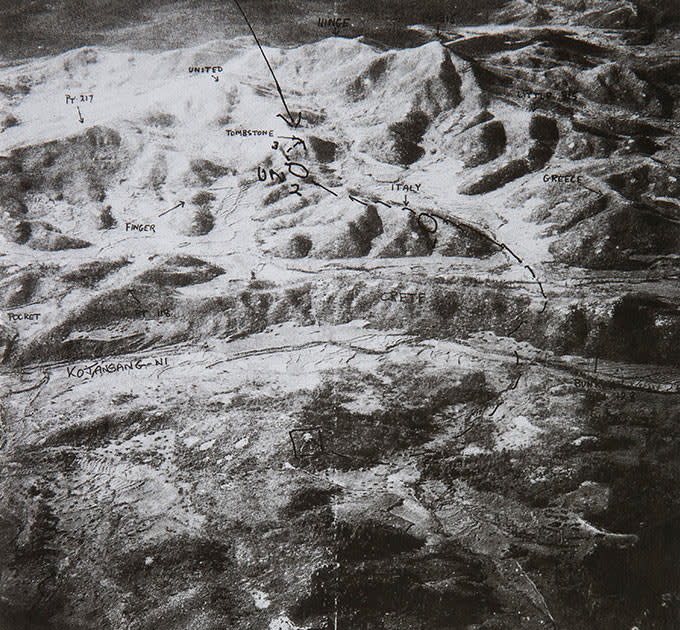
Aerial photograph of the Commonwealth fortified defensive line towards Bunker Hill and Point 118, August 1952
“It was a very dark night. We had tremendous fire power orchestrated: the American 155 howitzer and 25-pounders from the New Zealanders, all zeroed in on targets if they were called.
“Jonathan and his team went through me. I remember shaking his hand and wishing him good luck and then suddenly an almighty battle took place, a lot of firing. Nothing visible, it was pitch black except the light of tracer and so on. We were then beginning to be fired upon and mortared from the side. This battle went on, and then suddenly nothing. I wondered what the hell to do. We were still being mortared a bit but not heavily; they didn’t know quite where we were.
“So, I then took our team, which was about 20, right up to about 15-20 yards from the trench, and I came across all the wounded and the dead from Jonathan’s Pioneers.
“So we dragged them out, 10 of them, something like that. Some were missing. Jonathan had gone, nobody knew where he was. Cpl Guess was his No 2, he was gone, and nobody knew where. The soldiers were all completely dazed – they didn’t know which way was up.
“We collected what we could, then firing started intensely on us and around us, so I started calling, my colonel said I was very extravagant, I called everything I could to fire on either side, because I worried about a whole army coming forward and scooping us up. There was a whole battle royal for about an hour and then gradually I got the wounded back.
“We searched as much as we could. My wireless operator Ginger Nutter was terribly good – he was mentioned in Despatches.
“I have nightmares probably once a week. Even now, I struggle to get to sleep. What could I have done better? I ought to have done better. I ought to have found them, why not?
“There was no sign, no noise of any soldier being wounded. What happened – I was told afterwards – was that Jonathan was dead in the trench. He’d got into the trench, and so had Cpl Guess. Cpl Guess was wounded, and he remembered Jonathan’s body being carried down the trench – and then he fell unconscious. Cpl Guest was a prisoner for the rest of the war.
“I got us all back relatively safely and then the colonel said ‘well, what do you think?’ I said, I think we should go back – I’ll take a small team back now and go and look. I had a lie down for half an hour and had a cup of tea. I was scared but knew I had to do something.
“I went back in day time and took two or three people and a wireless operator. We crawled two or three hundred yards to within about 100 yards of the trench and the smoke was coming down all the time. It was clear to me there was nothing in front of the trench, there were no other wounded, so I then called more fire down and reported back and withdrew.
“I was then told I had been given the immediate award of the Military Cross. It didn’t mean anything at that point, I hadn’t sensed the glory of it. I was astonished because they were quite rare. I think it’s more difficult in a real war like World War II to be noticed and to be honoured for bravery or stupidity.
“There is no glory in this – it is just dreadful and one changes with age. As a young 21-year-old just out of Sandhurst you always want the discipline you’d been trained for and therefore it was… one was scared most of the time but you couldn’t show it at all because it was contagious. Some did show it, some sergeants did show it who’d probably had their fill of it in World War II.
“I don’t think the war was terribly well-handled on a strategic front. I mean the getting of the prisoner, which was the main intent, I don’t think it mattered a damn.
“Intelligence was pretty poor anyway; a million Chinese crossed into Korea and we didn’t even know. We had McArthur denying that the Chinese were there. I would have thought it better to hold onto your ground, not give ground, make sure that you were as defensively aggressive as you possibly could be, rather than be going out for no ground gaining. How do you extract somebody from a defended location and bring them back and say ‘He's from this Army’?
“There was no glory at all. One was proud of the regiment and that filled a void, if you will. And, again, it's contagious and you exhibit pride – and then people want to belong and they will march proudly and then tell their stories proudly and so on.
“We crossed a river on a patrol and laid ambush in a village. The temperature dropped rapidly, an enemy patrol came and I ordered to fire, feebly, and... not a sound. They were Sten guns and had got water on them crossing the river. They had frozen and wouldn't work, so we threw a few hand grenades and everybody went away. There was not a great thirst to kill the enemy. Should I have ordered us to go through the village and kill these people? I’m thinking about this now. I think they had some wounded, we heard little bits of some cries and so on but we didn't follow up. I didn't quite know why, I didn't see the point. There wasn't a lust to kill… thank God.”
Tony feels strongly about remembering the war and those that fell.
“You either talk about these things or you don’t. I want to talk about it because I want those people who didn’t come back or who are now unwell as a result to be remembered, rather than just be forgotten. They bled and shared misery and very difficult conditions and it’s all water under the bridge now, isn’t it?
“I think [Korea] has been grossly, grossly ignored. All the generals and those who could have made an influence, because politically they were more powerful, are no longer there. You’ll probably find people like me are now the most senior and we’re not here forever, and of course it goes.
“It was quite definitely worth it or else the East would be red now, would be Communist. Taiwan would have gone undoubtedly, probably Malaysia, which was also in insurrection.
“What has happened [is that] it has converted freedom to a significant economy in the world and a nation that is proud and responsible, and therefore by God was it worth it, by God it was worthwhile.”
Sam Mercer, Gloucestershire Regiment, A Company, 1 Platoon
Age when deployed: 20 yrs

“I think you can say that I survived through determination, bloody mindedness … and a very large slice of Lady Luck.” Sam Mercer, 88, photographed at his home
Sam spent a couple of years stationed in Jamaica after joining up. “I didn’t think much of it, too hot, but that’s a personal thing.”
“After that we were in Colchester, then eventually we were under the command of Col Carne, a wonderful man. He was a man of few words but when he spoke you listened. He wouldn’t use three words where two would do. But thank goodness we had him when we needed him.
“We were warned for active service for the Far East, then somebody said, ‘I think it’s Korea’. I said ‘Korea? Where the bloody hell’s that, never heard of it!’ Well, anyway, we soon found out.
“We arrived in Pusan around November 9-10 in 1950, and it wasn’t the Korea you’d know today.
“This was a United Nations enforcement purely, and it wasn’t us being warmongering or anything like that. We didn’t think over much of it, we were just doing our duty, we were told we were going to Korea.”
Sam Mercer was a private in 1 Platoon, defending Castle Hill. “I felt totally confident, we had a good CO and our company had a good commander, who was sadly killed in the battle, Major Pat Angier.
“On the Castle Hill side at the beginning of the battle we had five officers: the company commander, three subalterns and a young gunner OP (observation post). Come the Monday morning, when we were ordered to evacuate the hill and go back to battalion headquarters, four of those officers were dead.”

“We get a little brassed off sometimes with ‘Gloster Hill this’ and ‘Imjin that’. All right, it made good headlines for you people, I know that, but for goodness sake we had a job to do and we were doing it.”
The fierce fighting along the Imjin against 29 Brigade raged incessantly for four days, with the Glosters facing some of the most concerted efforts of the Chinese.
“Someone threw a hand grenade in my direction. Fortunately I heard it, saw it and you couldn’t have got a piece of rice paper between me and Mother Earth. I don’t remember feeling any fear at all, the adrenaline was flowing.
“In the battle we lost 30 killed and a further 14 in captivity. If we had been up against the north Koreans and not the Chinese very few of us would have survived. Well, I certainly wouldn’t.
“On that last morning, we were at that time concentrated on Hill 235, and we realised then that there was no way out. I was wounded twice slightly by a mortar bomb or something. I lost the sight in one eye and shrapnel in one of my legs. I was taken out of the battle by this point and I then fell asleep. None of us had had any sleep for 72 hours or more and, not surprisingly, my head touched the ground I was gone… boom.”
Mercer woke up to find himself in captivity as a prisoner of war. “When I woke up I realised I was with a group of wounded and we had the MO (medical officer) with us, Doc Hickey, and that man worked miracles when he was a prisoner. We also had the Padre (Rev SJ Davies) with us, who wrote the book In Spite of Dungeons – that’ll give you an insight into the sort of treatment that our people received that wasn’t friendly.”
The wounds he’d sustained made moving difficult. “The Chinese came up to mop us up and order us to our feet, and I rapidly became what is known as ‘Tail End Charlie’. I just couldn't keep up and so, for some reason, he (the Chinese soldier) shot me through the leg. I was just a bloody nuisance. I tell you what, when you’re sitting on the ground looking up the muzzle of a rifle it doesn't half concentrate the mind, I tell you that.
“I think I managed to get myself down the side of the hill without help – it took me most of the day but I did it. I think you can say that I survived through determination, bloody mindedness – and only a British soldier can be bloody minded – and a very large slice of Lady Luck.
“I was bloody angry but that said, if all that hadn’t happened I wouldn’t have met my wife. My wife, bless her, was a nurse in Roehampton, and later on when we had been released and were being sorted out I was a patient in the orthopaedic ward in Queen Mary's hospital. And Audrey, or Staff Nurse Evans, as she was known then... as soon as I saw her I knew instinctively that she was the one. When I finally lost her in 2011 we had been together for over 50 years.”
Mercer was picked up eventually by the Chinese, put in the back of one of the British ambulances with other casualties, including enemy combatants, and driven across the river. “Instead of going over the smooth sandy river bottom we were going bumpity-bumpity-bump over the dead Chinese bodies.”
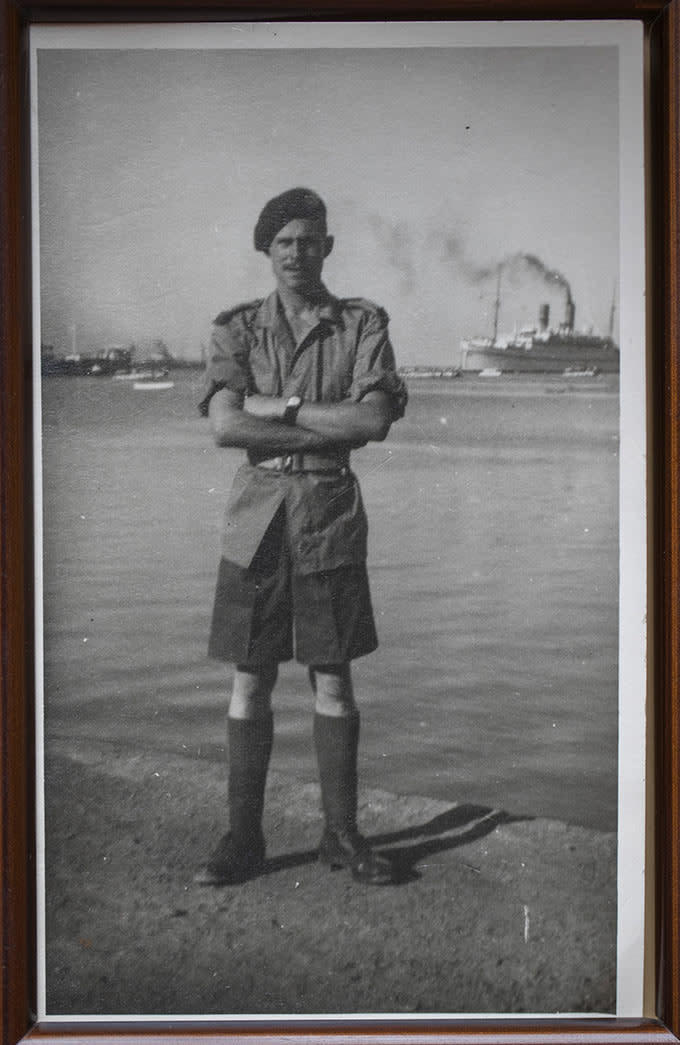
It took eight months for Sam, two other wounded Glosters and an American to make it to the PoW camps in the north of Korea, travelling by night and escorted by Chinese guards stopping in various villages along the way. “They began to realise that by keeping us alive there was some mileage to be made. They were saying ‘This is our lenient policy, we do not shoot prisoners’ (much!) in a sort of pidgin English.
“That eight months was quite adventurous, especially the incident with the bomb,” (Mercer and the three others were almost killed in a US air raid whilst overnighting in a village).
Most of the Glosters were held in what was known as Camp One, but Mercer and the others were taken to Camp Five, which was also where a large number of Turkish prisoners were kept. After eight months he was moved again to Camp Three, where he remained until his release.
“Life is what you make of it, I’m glad I did go through that, it was interesting. It was an interesting part of my life. If that hadn’t happened to me I wouldn’t have met my wife, and that as far as I’m concerned made it all worth it.
“When I was released in April ’53, I came out with the sick and wounded before the Armistice and when they took us to Japan, that was luxurious. I had my first bath in two-and-a-half years. We spent our first night of freedom in an American MASH. And of course, bless ’em they meant well but they had no idea, what did they give us for a meal? Steak and mashed potato followed by ice cream. We couldn’t manage it, y’know. We had been living on rice, barley and millet for a couple of years and we couldn’t do it and had to say ‘no thank you’. ”
On combat
“Well you’re trained, to put it bluntly, trained to kill, and yes I have fired at live targets. I suppose I should say this with some shame, I have fired at other human beings but then that’s what you’re trained to do. You do not look at your opponent as some mother’s son. You look at him quite simply as someone who is trying to do to you same as you're trying to do to him, and you get on with it. I know there is such a thing as PTSD. I know that, I accept it, but I don’t know why it has never affected me. I have never had any nightmare or bad dreams or anything like that, probably because I met Audrey and we settled down together. I can only put it down to that.
“War is a horrible thing, I know. I sometimes despair whether the human race will ever learn, but don’t think they ever will. You will always find that there is some person who is determined to stand head and shoulder above the rest.”
The Forgotten War
“I think we have probably been side-tracked, with campaigns like Iraq, Afghanistan and Bosnia which are remembered and quite rightly so, but I think also that it was a United Nations effort in Korea. It shouldn’t have been (side-tracked), we suffered more casualties in Korea than Afghanistan, Iraq and Bosnia and several other conflicts, it’s just never been given the space that it should.
“The bit I’d like you to remember was when that young Korean nurse knelt down beside the bed, looked me straight in the eye and uttered these words: ‘You my hero’.”
CSS block - keep clear
Registration wall
You might also like
Samsung logo 31 Oct 2018,9:15am
Samsung reports record profit despite smartphone sales slump
The Korean-Japanese girl group Iz*ONE 31 Oct 2018,6:30am
New K-pop idols caught up in South Korea's diplomatic feud with Japan
A tunnel of Punggye-ri nuclear test ground is blown up during the dismantlement process 31 Oct 2018,6:30am
North Korea 'preparing to allow international inspectors to visit Punggye-ri nuclear test site'
A North Korean wooden boat is seen near a patrol ship of Japan Coast Guard. off Matsumae town, Hokkaido northern Japan 26 Oct 2018,6:30am
North Korean fishermen 'defy water cannon in battles with Japanese coast guard'

 Yahoo News
Yahoo News 